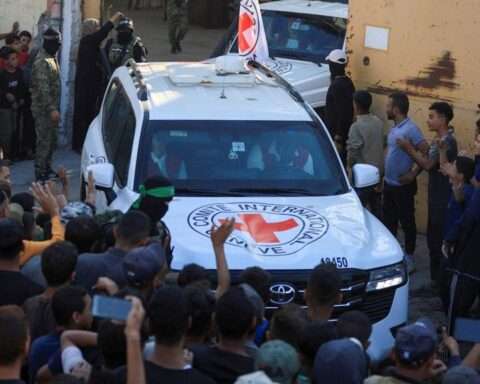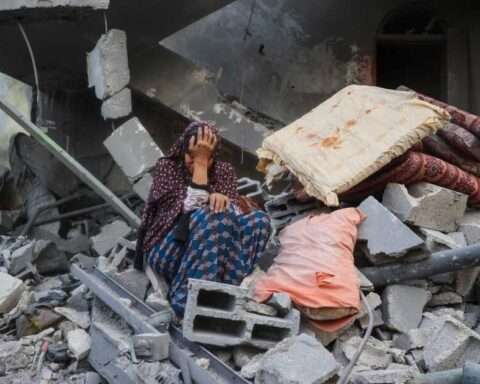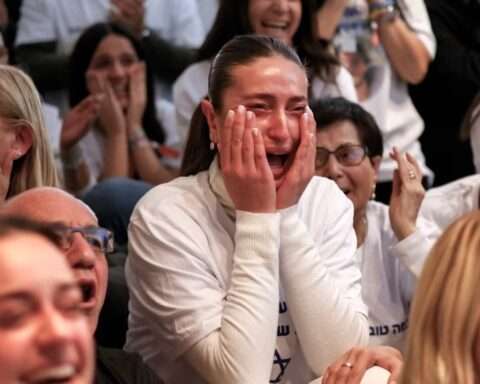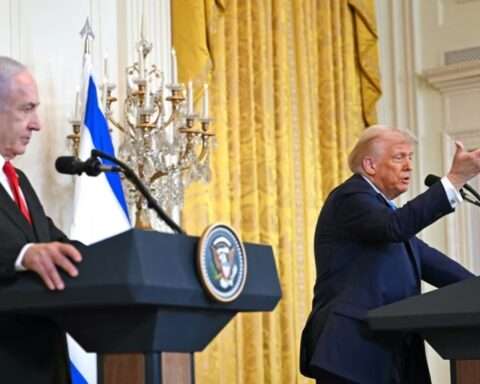An Israeli airstrike hit an apartment building Monday in Beirut in the first apparent attack inside the city since the eruption of cross-border fighting between Israel and the militant group Hezbollah nearly a year ago.
A Palestinian militant group called the Popular Front for the Liberation of Palestine said Monday’s strike killed at least three of its members.
Israel’s military did not mention strikes in the area early Monday, but said it was conducting aerial attacks in southern and eastern Lebanon against Hezbollah targets.
Israeli strikes have hit the edges of Beirut, including one Friday that killed longtime Hezbollah leader Hassan Nasrallah.
That attack further raised fears of a widening regional conflict as Israel also battles Hamas militants in the Gaza Strip.
French Foreign Minister Jean-Noel Barrot was in Lebanon Monday on a mission to try to contain the situation. After arriving late Sunday, Barrot told Lebanese Prime Minister Najib Mikati that French sought an immediate halt to Israeli strikes in Lebanon.
Saudi Arabia on Monday expressed “great concern” about the situation in Lebanon and said Lebanon’s sovereignty and territorial integrity should be respected.
U.S. President Joe Biden told reporters late Sunday that he would be speaking with Israeli Prime Minister Benjamin Netanyahu. Asked if an all-out war can be avoided, Biden said, “It has to be.”
Lebanon’s Health Ministry says more than 1,000 people have been killed and 6,000 wounded in the past two weeks. The count does not include a breakdown of how many of the dead are militants and civilians. In addition, the Lebanese government says around 250,000 people are staying in shelters after fleeing their homes to escape the fighting.
The fighting has killed 49 people in Israel and displaced tens of thousands of people near the border.
Asked about the recent events in the region, White House national security spokesperson John Kirby told ABC’s This Week that “Israel has a right and a responsibility to eliminate this threat to their people and to their land.”
“At the same time, we believe that we do need to look for ways to deescalate the tensions,” he added.
Along with Nasrallah and other Hezbollah leaders, Israel killed the deputy commander of Iran’s Islamic Revolutionary Guard Corps. Iran’s foreign minister said Nasrallah’s death “will not go unanswered,” and Tehran declared five days of mourning for him.
Israeli analysts say they expect some kind of response to the killing of Nasrallah, but it could also be directed at Israeli or Jewish targets abroad.
Colonel Miri Eisen, the director of the International Institute for Counter Terrorism in Israel and an expert on Hezbollah, mentioned the Iran-backed Hezbollah attack on the Israeli Embassy in Buenos Aires in 1992 that killed 29 people as an example.
“I don’t know what Iran will do. I absolutely think they will respond, absolutely. I think they will use, as Hezbollah by the way will use, they will use the forces they have built, some of them jointly, the Al-Quds Iranian Revolutionary Guard force. I think that they will respond in the world,” she said.
Israel has called on Israelis abroad to exercise caution and stepped up security around Israeli embassies.
But Eisen said that even without Nasrallah and the senior leadership that has been killed, Hezbollah still presents a serious threat to Israel.
“This isn’t about eliminating, it’s not a knockout. This isn’t the end of the game and Hezbollah was in it for the long term. In the immediate sense, it’s not elimination but also that Israel still has militarily immediate threats that are continually being taken care of still with Hassan Nasrallah not around,” she said.
Israel says it continues to maintain the same goals – to weaken Hezbollah so that the Israelis who were forced to leave their homes amid Hezbollah rocket attacks near the Lebanese border can go home, and to free the 101 Israeli hostages whom Hamas continues to hold in Gaza.
Hezbollah broke a relative calm along the border after Hamas’ October 7 terror attack on Israel triggered the war in Gaza. Israel says Hezbollah has fired nearly 9,000 rockets at communities in northern Israel since then. The militant group says it is acting in solidarity with Palestinians and its fellow Iran-backed ally, Hamas.
Hamas has been designated a terror group by the United States, United Kingdom, European Union and others. Hezbollah also is a U.S.-designated terror group.
Some information for this story was provided by The Associated Press, Agence France-Presse and Reuters






